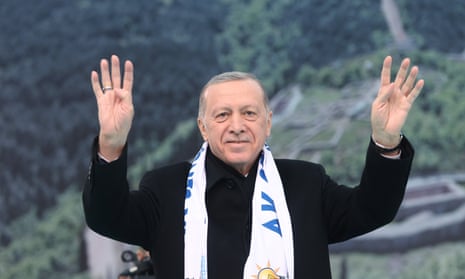That Turkey is a “vital strategic ally” of the west is the sort of truism on which people such as Joe Biden and Jens Stoltenberg, Nato’s secretary general, are raised. Yet what if the old saw no longer holds true? What if Turkey’s leader, exploiting this notion, betrays western interests in a pretence of partnership? Should not that leader be treated as a liability, a threat – even ostracised as an enemy?
Geography doesn’t change. Turkey wields significant influence at the crossroads of Europe, Asia and the Middle East. Yet the increasingly aggressive, authoritarian and schismatic policies pursued at home and abroad over two decades by its choleric sultan-president have upended long-cherished assumptions. Turkey’s reliability and usefulness as a trusted western ally is almost at an end.
As the most important Turkish elections in a generation move towards a febrile climax in May, and as the western democracies contemplate critical choices in Ukraine, over Vladimir Putin’s Russia, and in Iran, Syria and Israel-Palestine, these dilemmas boil down to one basic question: is it time to admit that two-faced Recep Tayyip Erdoğan is no friend of the west – and punish him accordingly?
Erdoğan’s blocking of Sweden’s attempt to join Nato is the latest, egregious example of hostile behaviour. He claims Stockholm harbours “terrorists” from the militant Kurdish group the PKK (Kurdistan Workers’ party). In truth, his veto stems from his long-running anti-Kurd vendetta, which includes legal moves to close the HDP (Peoples’ Democratic party), the main Kurdish-backed opposition, before the elections. The Nato row now threatens to explode amid a spate of Qur’an burnings, diplomatic protests and violent retaliation.
Erdoğan is also demanding the extradition from Sweden of political refugees, notably Bülent Keneş, former editor-in-chief of the Today Zaman newspaper, whom he accuses of supporting a failed coup in 2016. Intimidatory tactics targeting journalists are part of a broader post-coup drive to stifle public debate, manipulate the constitution, subjugate judges, purge the army and civil service – and strengthen de facto one-man rule.
Using Turkey’s Nato membership for domestic political ends is a typical Erdoğan gambit. Yet it also wilfully obstructs Sweden’s (and Finland’s) legitimate wish to bolster their defences after Russia’s invasion of Ukraine, while undermining Nato efforts to show unity and resolve. This is by no means the first time Erdoğan has favoured Moscow over Nato partners.
Erdoğan rejects and circumvents Ukraine-related sanctions. Turkey’s trade with Russia grew by nearly 200% in the six months after the invasion, including higher energy imports. His purchase of Russian surface-to-air missile systems infuriated Washington, which views them as a threat to Nato forces. His posturing as a Ukraine mediator helps Putin maintain the pretence he’s interested in peace.
Erdoğan’s plans to launch another armed invasion of northern Syria fly in the face of US-led efforts to support the anti-Bashar al-Assad democratic opposition and suppress Islamist terrorism. In reality, destabilising incursions and occupations of the Syrian and Iraqi borderlands are yet another extension of Erdoğan’s obsessive war on the Kurds. His prospective rapprochement with Damascus further undercuts western security policy.
If Erdoğan’s sickening schmoozing of Putin, double-dealing over Ukraine, neo-Ottoman overreaching and on-off aggression towards fellow Nato member Greece are not sufficient proof of bad faith, then consider his other war – on his country’s democracy. Human rights abuses aside, Erdoğan has made a huge mess of Turkey’s economy. Inflation is at 58%, living standards are plummeting. More than 70% of 18 to 25-year-olds say they would prefer to live elsewhere.
In any normal democratic contest, such incompetence would cost him the presidency and his AK (Justice and Development) party’s parliamentary majority. But Erdoğan does not do normal. In recent weeks, he has increased the national minimum wage by 55%, lowered the retirement age, boosted public sector salaries, and expanded loan and debt-forgiveness programmes. It’s a blatant, state-funded attempt to buy votes.
At the same time, Erdoğan appears bent on eliminating presidential rivals. The HDP’s best-known leader, Selahattin Demirtaş, is already in jail. And if Erdoğan has his way, he will soon be joined by Ekrem İmamoğlu, Istanbul’s popular mayor and a leading light of the main CHP (Republican People’s party) opposition. İmamoğlu is appealing against a politically inspired prison sentence and faces a range of additional trumped-up charges.
Electoral bribes and political skulduggery, unchallenged by state-controlled media and obscured by a climate of fear, point to another Erdoğan victory. Six opposition parties, joined together in a new Nation Alliance grouping, issued a manifesto last week vowing, among many other things, to curb presidential powers. But they have yet to agree on a standard-bearer – and without the HDP, polls suggest, they will not win a parliamentary majority.
after newsletter promotion
All of which leads back to the original question: what should the western democracies do about Erdoğan, assuming he wins again? More sanctions, including on him personally, are one possibility. US senators suggest that Ankara may be denied F-16 fighter jets promised by Biden if it continues to sabotage Nato. Stalled EU membership talks could be formally frozen, indefinitely. Yet, to get Erdoğan’s attention, any punitive measures will need to go further.
Overcautious, risk-averse Biden and Stoltenberg must let go of old, discredited thinking. They should remind Erdoğan that Nato is a community of values as well as rules; welcome Sweden and Finland into the alliance via a vote of all 30 members; and suspend Turkey’s membership, if necessary by amending the North Atlantic treaty. If he doesn’t like it, well, tough.
Turkey inhabits a rough neighbourhood. No one expects torrents of peace and love from its leaders. And it could be a valued ally again. But Turkey is not indispensable. If need be, the western democracies can live safely without it – until that happy day dawns when Ankara’s cantankerous sultan is finally defenestrated and debagged.
This article was amended on 6 February 2023 to clarify that Bülent Keneş is a former editor-in-chief of the English-language Today Zaman newspaper, not its Turkish-language sister title, Zaman.
Do you have an opinion on the issues raised in this article? If you would like to submit a letter of up to 250 words to be considered for publication, email it to us at observer.letters@observer.co.uk

